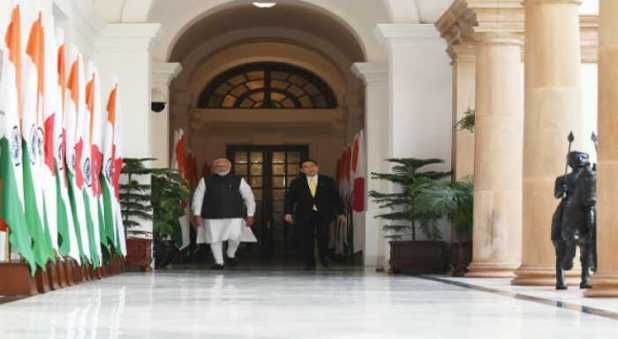
New Delhi, March 19 : Prime Minister Narendra Modi and Japanese Prime Minister Fumio Kishida on Saturday held a “lengthy and in-depth discussion” on Ukraine after which both sides agreed on four points, which do not find mention in the joint statement. Ono Hikariko, press secretary of the Japanese Ministry of Foreign Affairs, in a late night briefing with reporters, said that PM Kishida in his talk with PM Modi said the “Russian aggression is an outrage which constitutes a clear violation of international law, and reiterated Japan’s condemnation of the Russian actions”. PM Kishida, who hails from Hiroshima that was bombed in 1945, also reiterated that “any nuclear threat cannot be tolerated”. “He voiced the Japanese position that the international comm ty should take resolute action in a ted manner and asked PM Modi to cooperate further, including working on Russian President Putin to maintain a free and open international order.” After a lengthy discussion on Ukraine, the two sides agreed on four points, she said. They are: 1) Any attempt to change the status quo by force cannot be accepted anywhere in the world. 2) We should meet to seek for peaceful resolution of the conflict. 3) The two would jointly tackle the situation for the immediate cessation of the violence and breaking of the deadlock. 4) They would jointly support Ukraine and neighbouring countries. She said that PM Kishida asked PM Modi “to cooperate” on the Ukrainian issue and “work on President Putin to maintain a free and open international order”. Asked why the joint statement issued by both sides did not include her account of what had transpired on the issue between both leaders, the spokesperson said that “the actual discussion between the leaders is what I have told you, and the joint statement is one that the officials have been negotiating and agreed on this text; and we do agree to joint statement. But leaders had a lengthy discussion on Ukraine today, and the four points were agreed upon,” she added. On China, they had a “candid discussion” during a small group meeting between the two sides, the spokesperson said. The two sides “were strongly opposed to laterally changing status quo by force in the East and South China Seas and the exercising of economic coercion”, a reference to China’s hegemonistic forays in the South China seas and laying claim to the Senkaku islands. Regarding the Indo-Pacific, the two sides shared the recognition for close coordination, bilaterally or among the Quad and confirmed that in the upcoming Quad summit in Tokyo, to be held in the first half of this year, they will discuss practical cooperation in vaccination, climate change and tech issues, she said. RN

